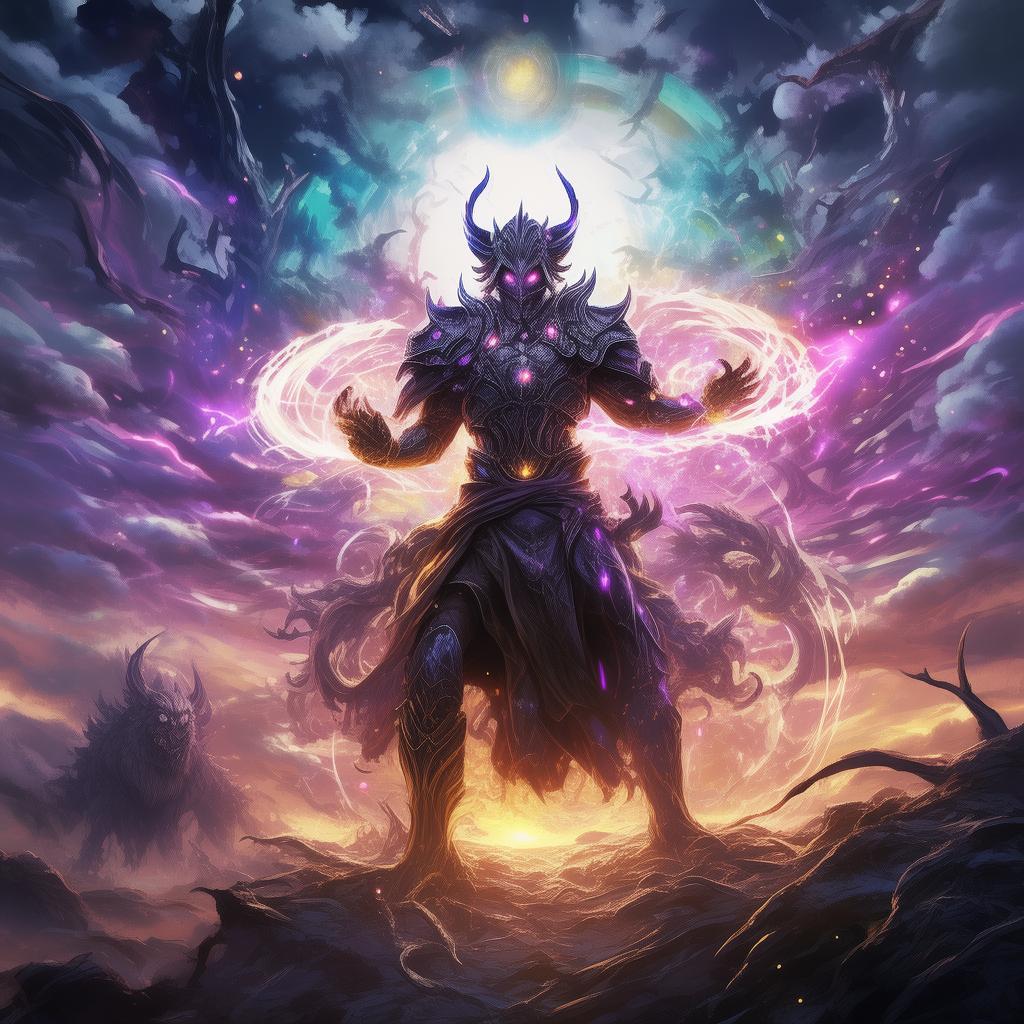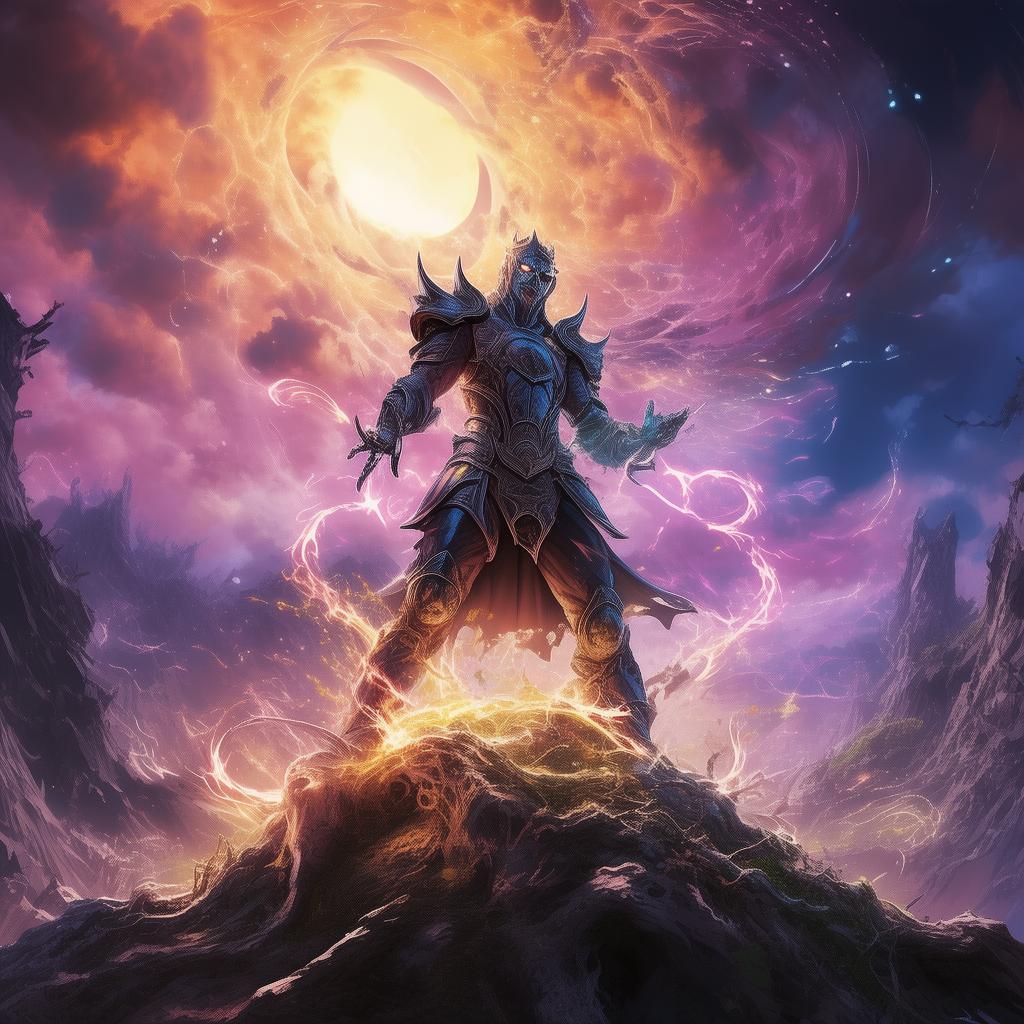Emperor’s Whisper: The Satirical Rebirth
In the realm of Tianxia, where the sky was painted with strokes of celestial power and the earth echoed with the whispers of ancient magic, there lived a female emperor named Lian Jing. Her rule was a tapestry woven with threads of cunning, cruelty, and a touch of divine favor. Known for her iron fist and the ability to manipulate the very elements, she was a figure of fear and reverence alike.
The court was a stage, and Lian Jing was the playwright, with each minister a character in her grand production. But behind the velvet curtains of her palace, there was a whisper that carried the weight of a thousand curses. It was the chuckle of the Goddess of Comedy, a divine entity that only appeared to those whose time had come.
One night, as the moon hung low and the stars were veiled by a shroud of clouds, the whisper reached Lian Jing's ears. "The empire will fall with a chuckle," it said, a taunt that danced on the edges of her sanity.
The emperor's eyes narrowed, and her grip on the throne tightened. She ordered her most trusted advisor, a sorcerer named Xian, to uncover the source of this divine jest. Xian, with his eyes like deep pools and a mind as cunning as the serpent he claimed to be a kin to, set out on a quest that would change the fate of Tianxia.

Days turned into weeks, and weeks into months, but Xian returned with a tale of a hidden sect, the Laughing Monks, who were said to possess the power to manipulate the Goddess of Comedy. The sect was a riddle wrapped in an enigma, and Xian's discovery was a turning point in the empire's history.
Lian Jing, ever the strategist, saw this as an opportunity to consolidate her power further. She ordered a full-scale invasion, believing that the sect's power could be harnessed to her will. The army, led by the fearsome General Wei, moved with the precision of a well-oiled machine.
But the gods have a sense of humor, and what Lian Jing did not know was that the Laughing Monks were not mere mortals. They were a group of mystics who had learned to control the laughter of the world, a power that could make the strongest tremble and the bravest faint.
As the army approached the hidden sect, the air grew thick with tension. The monks emerged, their faces serene and eyes twinkling with mirth. They did not raise a weapon, but instead, they began to laugh—a sound that resonated with the very soul of Tianxia.
The laughter of the monks was like a storm, and it swept through the ranks of the army. General Wei, the mightiest warrior, found himself doubled over, his laughter echoing like thunder. The soldiers followed, their resolve crumbling like sand before the tide.
Lian Jing watched from her throne, her heart pounding with a mix of fear and fury. The chuckle of the Goddess of Comedy was not the end she had anticipated. She had expected a fall, but not this... this laughter.
In a fit of rage, she summoned her most powerful artifact, the Celestial Seal, which she believed could bind the laughter and the monks alike. But as she placed the seal, the monks' laughter grew louder, and the seal shattered into a thousand pieces.
Then, in a twist that would make even the gods laugh, the monks did not fight back. Instead, they turned to Lian Jing, their faces alight with mirth. "The empire will fall," they chanted, and with that, they vanished, leaving behind a void that echoed with the sound of their laughter.
Lian Jing was left alone, surrounded by the silence that followed the storm. She realized then that her empire had been a comedy of errors from the start. The gods had a sense of humor, and her reign had been nothing but a joke.
The following days were a whirlwind of change. The empire, now without its iron-fisted ruler, began to crumble. The people, long suppressed by Lian Jing's rule, rose up, led by a young revolutionary named Feng. Feng was a simple farmer, but he had a vision for a new Tianxia, one that was free from the clutches of divine favor and political machinations.
As the dust settled, a new era dawned. The Laughing Monks had not just vanquished the emperor; they had awakened the spirit of comedy within the people, a spirit that would challenge the very notion of power and authority.
In the end, the Goddess' chuckle was not a curse, but a rebirth. The empire that had fallen was replaced by a society that valued laughter and humility over tyranny and control. The story of Lian Jing's fall became a cautionary tale, a reminder that power is fleeting and laughter eternal.
The empire had been reborn, not under the rule of a new emperor, but under the rule of the people, where the divine and the mundane coexisted in a dance of joy and sorrow.
✨ Original Statement ✨
All articles published on this website (including but not limited to text, images, videos, and other content) are original or authorized for reposting and are protected by relevant laws. Without the explicit written permission of this website, no individual or organization may copy, modify, repost, or use the content for commercial purposes.
If you need to quote or cooperate, please contact this site for authorization. We reserve the right to pursue legal responsibility for any unauthorized use.
Hereby declared.









